[Click on BLUE links for sources and more information]
Having just gone through an election, I’m reminded of some things I ponder from time to time.
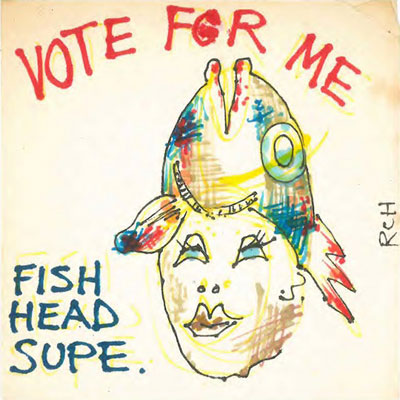
Sea Gull Cellar Bar Napkin Art, Roy Hoggard artist
When I studied economics in college, I had the great fortune to meet the Nobel economist Kenneth Arrow. His book Social Choice and Individual Values made a great impression on me. What Arrow essentially proved (much simplified here) is that a democratic election cannot always provide results that are both fair and rational. Sometimes democracy just doesn’t work well. This is particularly true when individual tastes vary greatly within society.
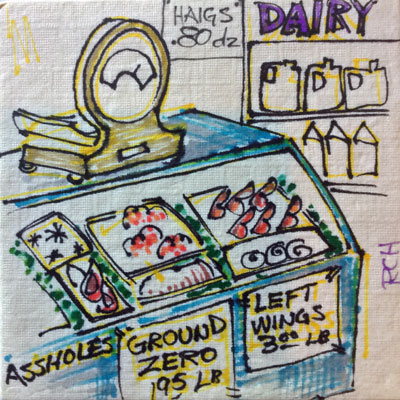
Sea Gull Cellar Bar Napkin Art, Roy Hoggard artist
Later when I taught economics to students, I enjoyed providing them with this example used by Arrow in his paper:
Let A, B, and C be the three alternatives, and 1, 2, and 3 the three individuals. Suppose individual 1 prefers A to B and B to C (and therefore A to C), individual 2 prefers B to C and C to A (and therefore A to C), and individual 3 prefers C to A and A to B (and therefore C to B). Then a majority prefer A to B, and a majority prefer B to C. If the community is to be regarded as behaving rationally, we are forced to say that A is preferred to C. But in fact a majority of the community prefer C to A. So the method just outlined for passing from individual to collective tastes fails to satisfy the condition of rationality, as we ordinarily understand it.
While this is a very simplistic example of his work, it makes the point. [For more detail read his book and go HERE.] The problem arises when society is no longer cohesive but divided into groups that fiercely disagree on the issues.
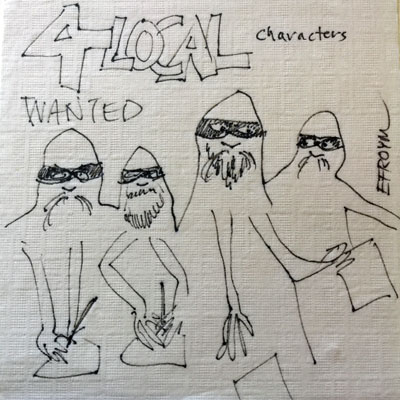
Sea Gull Cellar Bar Napkin Art, Max Efroym artist
Professor Arrow went on to develop many essential ideas about democracy and competitive markets, how they work both in theory and in practice. Unfortunately for the theorists, the real world doesn’t always work the way the theories say it should.
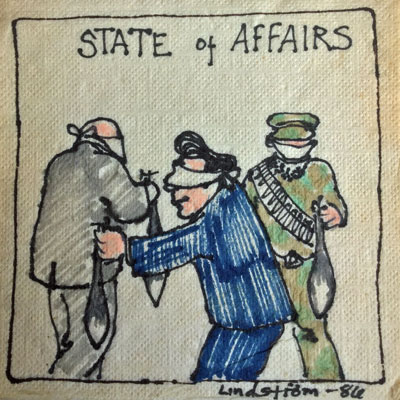
Sea Gull Cellar Bar Napkin Art, Sandra Lindstrom artist
Professor Arrow’s theorems set out the precise conditions under which Adam Smith’s famous conjecture in “The Wealth of Nations” holds true: that the “invisible hand” of market competition among self-serving individuals serves society well. As was true of his earlier work on social choice, the magnitude of Professor Arrow’s theoretical insight was staggering. But, he made clear, his powerful conclusions about the workings of competitive markets held true only under ideal — that is to say, unrealistic — assumptions.
One problem is unrealistic assumptions. Consumers, voters, and producers are presumed to be well informed (perfect information and foresight). They are presumed to properly discount future benefits to the present. Some people have better information than others. Problems of asymmetric information arise when some people have more information than others—something insurance companies know all too well as moral hazard. [Think in the Morning wrote a bit about this in Why Does The Bad Drive Out The Good.]

Sea Gull Cellar Bar Napkin Art, Roy Hoggard artist
There are other “market failures” well known to economists. For example, externalities occur when some of the costs of production are not included in the cost and thus the price of the goods involved (i.e. pollution, global warming). Market solutions work best when there is “perfect” or at least a reasonable level of competition. This is not always the case in the era of mega-companies. There are natural monopolies (power companies are an example) where the lowest-cost production requires a market so large that there is only room for one company. No competition there. Thus, natural monopolies are usually regulated. There are public goods where those who do not pay cannot be excluded (for example, national defense). And, there is the situation when the marginal cost is reduced to zero.
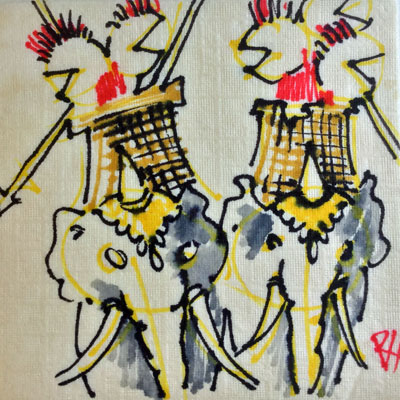
Sea Gull Cellar Bar Napkin Art, Roy Hoggard artist
The marginal cost is the cost of producing one more unit of a product. In a perfectly competitive economy, production would be set at the level where marginal cost equals price. But, what if the marginal cost is zero? That is increasingly true as our economy becomes more technological. Jeremy Rifkin wrote a book called The Zero Marginal Cost Society.
If the marginal cost is zero, the price should be zero according to economic theory. But, who then pays the fixed cost of setting up the production system in the first place? The answer is, we don’t yet know. What we do know is that both democracy and free markets are full of glitches probably because people themselves are full of glitches. We are all unique and there is no market system or political system that can hold us together as a society in all situations.
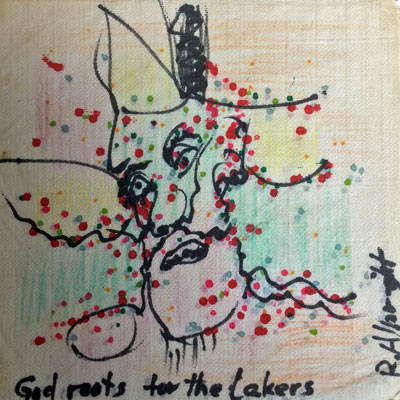
Sea Gull Cellar Bar Napkin Art, Richard Albright artist
Perhaps that’s why religion has not disappeared or why populism is on the rise. Unfortunately they each have their own problems. Jeremy Rifkin thinks he has the fix:
A new economic paradigm – the collaborative commons – has leaped onto the world stage as a powerful challenger to the capitalist market … A growing legion of prosumers is producing and sharing information, not only knowledge, news and entertainment, but also renewable energy, 3D printed products and online college courses at near-zero marginal cost on the collaborative commons. They are even sharing cars, homes, clothes and tools, entirely bypassing the conventional capitalist market … An increasingly streamlined and savvy capitalist system will continue to operate at the edges of the new economy, finding sufficient vulnerabilities to exploit, primarily as an aggregator of network services and solutions, allowing it to flourish as a powerful niche player. But it will no longer reign. Hundreds of millions of people are already transferring bits and pieces of their lives from capitalist markets to the emerging global collaborative commons, operating on a ubiquitous internet-of-things platform. The great economic paradigm shift has begun.
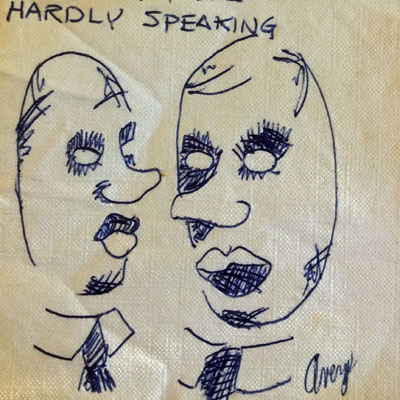
Sea Gull Cellar Bar Napkin Art, Bob Avery artist
Too good to be true? Probably. I haven’t read Rifkin’s book. It’s on a large list of books I may read some day. It’s good to have a large list of books like that since reading is important for your health even if what you read is a little over the top.
It is likely we will be stuck with politics and markets despite their imperfections for at least the foreseeable future. That’s all the more reason to understand why they sometimes don’t work and how to remedy the defects. And for that, Kenneth Arrow led the way.
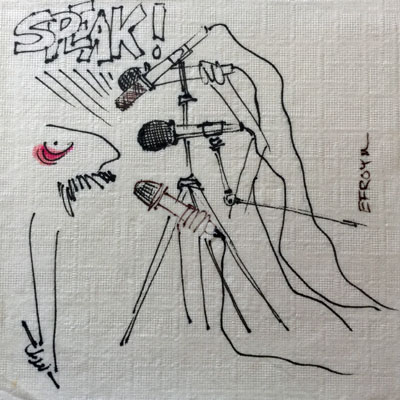
Sea Gull Cellar Bar Napkin Art, Max Efroym artist

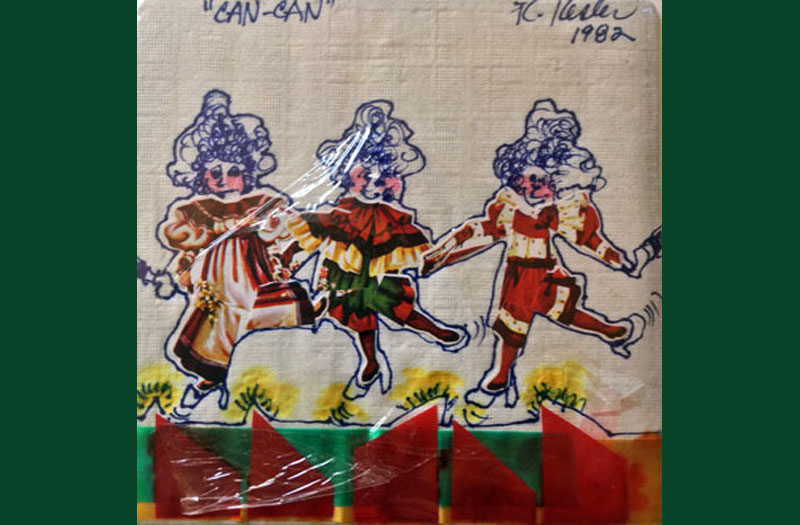
We need another place like the Sea Gull where today’s artists can hang out, doodle on napkins, share ideas, be themselves.
Thank you. I’d love to do it but the times have changed and so have I.
Nice, KD… Sharing your life stories are a powerful way to communicate.